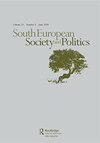激进党在西班牙取得突破后的地域两极分化
IF 4.6
1区 社会学
Q1 POLITICAL SCIENCE
引用次数: 2
摘要
欧洲的激进政党正在崛起。然而,很少有证据表明他们的突破是否会影响选民的政治态度,特别是在选举竞争的非经济方面。我们通过在西班牙最近的大选周期(2011年、2015年和2019年)中开展的小组调查来解决这些差距。我们发现,我们可以党(Podemos)和Vox党(Vox)分别在2015年和2019年的突破导致了选民在这个国家高度突出的领土维度上的意识形态两极分化,这是我们在2011年没有观察到的现象。然而,没有实现情感领土两极分化。本文章由计算机程序翻译,如有差异,请以英文原文为准。
Territorial Polarisation after Radical Parties’ Breakthrough in Spain
ABSTRACT Radical parties are on the rise in Europe. However, there is scant evidence on whether their breakthroughs affect voters’ political attitudes, particularly with regard to non-economic dimensions of electoral competition. We address these gaps using a combination of panel surveys developed during recent general election cycles (2011, 2015 and 2019) in Spain. We show that the breakthrough of Podemos and Vox in 2015 and 2019 respectively contributed to the ideological polarisation of voters’ positions on the highly salient territorial dimension in this country, a phenomenon that we do not observe in 2011. However, affective territorial polarisation was not achieved.
求助全文
通过发布文献求助,成功后即可免费获取论文全文。
去求助
来源期刊

South European Society and Politics
Multiple-
CiteScore
5.80
自引率
21.20%
发文量
14
期刊介绍:
A leading point of reference for scholars of Southern Europe, South European Society and Politics promotes both comparative and inter-disciplinary analyses, as well as offering innovative single county and sub-national studies. The journal acts as a forum for social, economic, cultural, contemporary historical and political approaches to research on the region, and is particularly keen to sponsor policy–focused studies in all these disciplines. The journal publishes research articles; South European Atlas with election reports and articles on other subjects of topical interest, and an extensive book reviews section, including both review articles and individual book reviews.
 求助内容:
求助内容: 应助结果提醒方式:
应助结果提醒方式:


